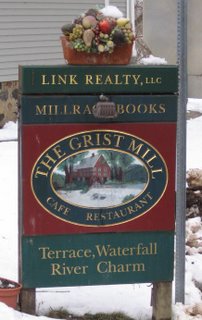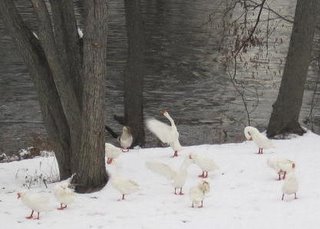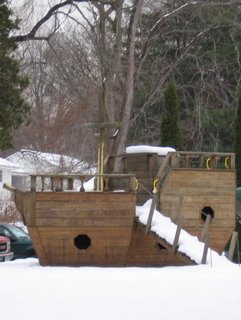"Today's walk was like a brisk tea, Tine," Rubob said as they returned home. "Some teas are brisk and some are savory. There wasn't time to stop and savor things today."
"It was more 'march than meandering' -- just as you said when we set out on our walk, Rubob," Tine replied.
At the start of the walk, Tine had been eager to see ice floes on the Farmington River. She had a notion that there might be some there today after she saw a photo in the newspaper showing ice fishermen gathered around their huts on a frozen lake.
"Though, come to think," Tine said, "we could probably see ice floes at home, it's so cold. I thought I saw an ice floe floating in my tea this morning, Rubob."
As Tine and Rubob made their way down their icy driveway, Tine thought about how they were returning to the pathways of their village for their walk today, after venturing outside its boundaries over the weekend.
"That's one of my favorite houses," Rubob, back in his element, said to Tine:

"It's like the return of Martin Guerre to his village," Tine said to Rubob, pursuing her theme and referring to a French film she and Rubob liked. But there was no sign that villagers were rejoicing over the return of Rubob and Tine, as the French villagers did over Martin Guerre's return.
The villagers were tucked away in their homes or out gathering seed in the world at large.

Rubob noticed a yellow house behind a stand of trees, and said, "How different everything looks without the green screen of summer, Tine. The snow transforms our view of the houses. "

Tine didn't think there was much to see at all, and she moved along quickly, eager to see ice floes on the river.
Two denizens of the village did come out onto the porch to greet Tine and Rubob, but their greeting, while loud and animated, wasn't very welcoming:

And a cow, who seemed as curiously stationary as the passenger Tine had seen on the platform at Millerton's closed railway station on Saturday, watched as Tine and Rubob passed by.

"It's unmoved by 'The Return of Rubob,' " Tine thought, chuckling to herself, as she and Rubob moved briskly along.
Rubob then dropped behind to admire the slate blue shutters on a house. "Come along -- we need to see the ice floes," Tine said.

"The newspaper had a story on house colors recently, Tine -- on how the old traditional colors are falling out of fashion, and slate blue was one of the colors mentioned. Now homeowners prefer pungent colors," Rubob said.
"Pungent?" Tine asked.
"Robust, if you like, Tine."
"That's pungent, over there, Rubob," Tine said, pointing to a door on the right.

"No, that's not really pungent,"Rubob said.
"It's cranberry, Rubob. What's more pungent than cranberry? But I suppose your favorite tea, Black Currant, is more pungent than Cranberry Autumn. Maybe you're right. They should have painted their door Black Currant."
They passed the sign for the Grist Mill and turned down the road that leads to the river -- "and the ice floes," Tine thought.

On their way down to the mill, they passed a wintery habitation whose denizen appeared to be out in the world at large, "perhaps hunting seals," Tine said to Rubob.

"You're right, Rubob -- the snow really does transform the way houses look in the winter," Tine said.
When they reached the river, Tine was very disappointed to see that the ice floes -- if there'd ever been any -- had melted or flowed down the river.

"I thought there'd be ice floes, Rubob. There were ice floes in 'Way Down East,'" Tine said.
"Way Down East?" Rubob asked.
"The silent movie that was filmed in the village. You haven't watched it yet. It was filmed right here on the river."

The film, made in 1920, stars Lillian Gish as Anna Moore, a poor farmgirl who moves in with rich cousins.
"The farmgirl is seduced by a scoundrel -- a Lothario, Rubob," Tine said, hoping to interest Rubob with a reference to a literary character. "She winds up on the river, floating on an ice floe." ("Just like the seal hunter, only perhaps less propitiously," Tine thought to herself. "It shows the hazards of leaving one's village.")
"There aren't any ice floes, but at least there are ducks and swans," Tine said.

"They, too, show how colors stand out in the winter," she said -- "or don't stand out, as the case may be. They're living testament to that fact, aren't they Rubob? Swans would do better to adopt a more pungent color, don't you think?"
But Rubob seemed absorbed in his own thoughts.
The two then walked up the wooden stairway to one of Tine's favorite little bookstores, the Millrace Bookshop, passing another sign of winter at the top of the stairs.

"The shop certainly has one of the most beautiful views from the window," Tine said.

"We need to be getting back," Rubob said soon after they entered the shop, because he thought he was going to be late for an appointment in the world at large.
It isn't easy being dragged out of a bookshop, especially one as inviting as the Millrace, and Tine lingered over the view -- and over the books -- for a few minutes.
Rubob made the mistake of pointing out a watering can at the door, and Tine dawdled a little more.

"Let's go, Tine," Rubob said, and the two resumed their walk, which once again was more of a march than a meander. Tine wasn't the one pushing things along anymore; there were no ice floes to be seen. It was Rubob leading the march, eager to join those denizens of the village who were out gathering seed and hunting seals.
On their way back, they passed another habitation that looked snowed in for the winter:

"Yes," Tine said, "houses do seem quite different in the winter. Some blend right in, but others look quite forsaken." Her thoughts turned to ice floes again.
"Hemmed in by ice just like Shackleton," she said to Rubob, who was rushing ahead and difficult to keep up with. “Frozen like an almond in the middle of a chocolate bar," Tine thought to herself, recalling a quote by a crewman in an account of Shackleton's ice-bound adventure in the Antarctic (because Tine loves all seagoing sagas).
“Frozen like an almond in the middle of a white chocolate bar,” Tine said to Rubob, revising the quote, but he was out of range, making for the next buoy in the channel leading home. "It goes to show the dangers of leaving one's village!" she called out to him, but he was eager to get home and do exactly that.
"I'm going to be late, Tine!"
Passing the pleasant homes in the village, Tine thought she'd be quite content staying home for the rest of the day, safe from ice floes.

Coming in the door of her own house, Tine thought: "All in all, a very pleasant walk."

























